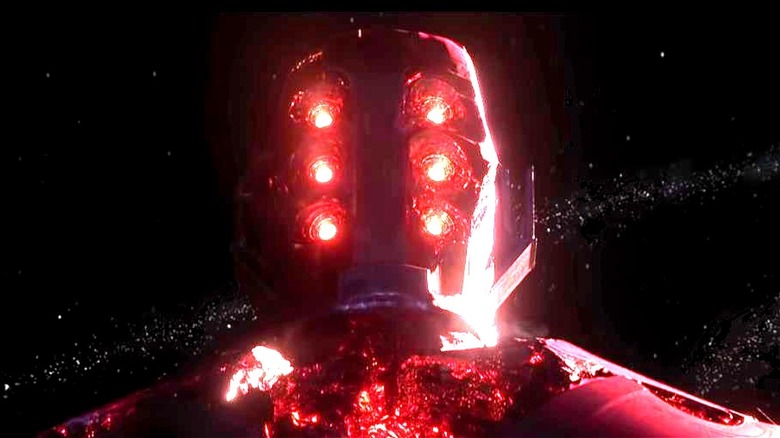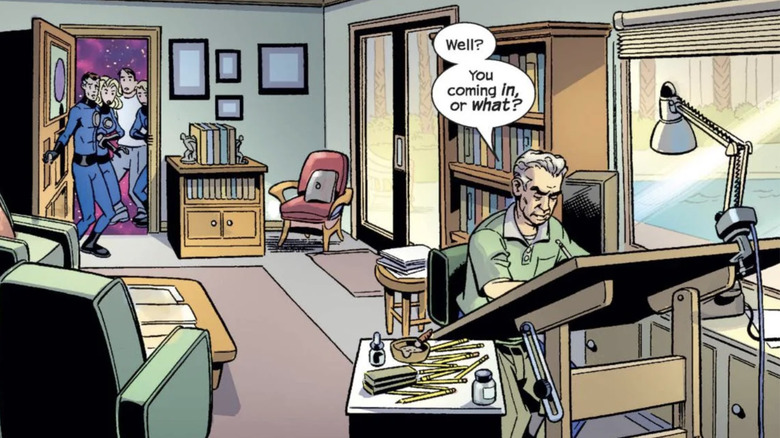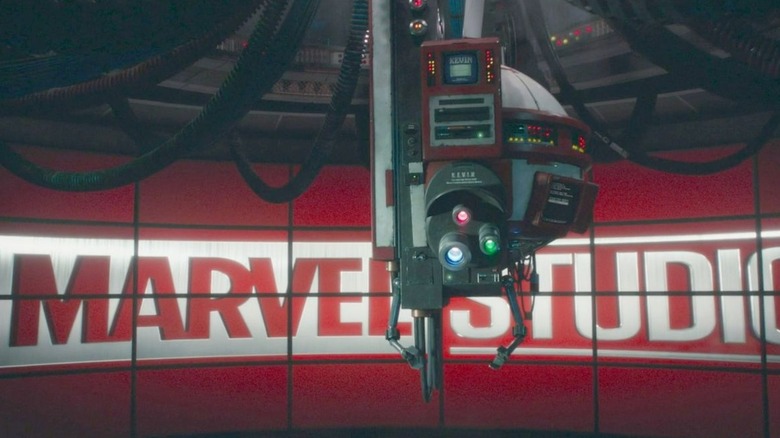Marvel's Most Powerful God Appeared Just Once & You'll Never See Him In The MCU
"There is no God! That's why I stepped in!" declared the megalomaniacal High Evolutionary (Chukwudi Iwuji) in "Guardians of the Galaxy Vol. 3." Powerful line, but oh how wrong he is.
The Marvel Universe (of both the comic and cinematic flavors) is home to many gods; Thor is one of the setting's A-list characters, after all. The Thunderer's fellow Norse Gods co-exist with the Greek/Roman pantheon. "Thor: Love & Thunder" showed there are enough gods out there to fill a whole metropolis, Omnipotence City — though Gorr the God Butcher wants to cut that number down to size.
Beyond adapting real mythological figures, the Marvel Universe also has the godlike Celestials; enormous, multi-colored (but still vaguely humanoid) beings older than the cosmos who maintain the universe. "Eternals" was the first MCU film to prominently feature Celestials, particularly their leader Arishem the Judge. Godlike power in Marvel extends even above the Celestials to the twin personifications of the universe, Eternity (glimpsed in "Love and Thunder") and Infinity. Above them, the Living Tribunal, who judges universes on the cosmic scales.
However, it's been shown that even these beings have their superiors. For instance, the only once-seen Celestial Scathan the Approver. It's been argued that Scathan, with his power to "approve" the existence of beings, represents the tight leash Marvel corporate holds on its writers and editors.
@sir_superhero "Into the Editing Hourglass, you little nerd" – Scathan, basically #marvel#comics#mcu#guardiansofthegalaxy#superhero#avengers
This metatext would track with the initial depiction of The One Above All, the deity described as the creator and absolute power of every (Marvel) universe. The One's name is non-denominational but the concept definitely evokes the Christian God. In the One's first appearance, it was suggested the entity's true identity is the Marvel Universe's literal creator: Jack Kirby. If the MCU ever adapts the One, it won't be like this.
In Marvel Comics, Jack Kirby is God
The One Above All is a recurring concept in Marvel Comics. It goes back to Kirby's name for the Celestials' leader, introduced during his original "Eternals" run in the 1970s. Al Ewing's "Immortal Hulk" introduces the One Below All, the destructive flipside of the deity as the Hulk is to Bruce Banner. The One Above All is sometimes depicted as a man bathed in golden light (because, again, God), but Mark Waid and Mike Wieringo's "Fantastic Four" was more meta.
In this "Fantastic Four" run, Ben Grimm/The Thing dies and the Four's remaining three set out to get him back. In "Fantastic Four" #511, after a journey through Heaven, they come face to face with God: Jack Kirby sitting at his desk, drawing their adventures.
Kirby's collaborator, Stan Lee, was famous for his cameos in Marvel movies before his passing in 2018. Why can't Kirby get the same honor? For one, he passed away in 1994. But even beyond that, the whole idea of him as a creator deity is tied to the story unfolding in the comic medium. The One Above All's pencil is the tool of his godlike power; he sends the Four home by redrawing the setting around them. "Deadpool: Secret Agent Deadpool" likewise depicts the One Above All as an unseen figure holding a giant pencil that can reshape reality. This wouldn't have the same effect in film.
The MCU's gods are movie producers, not comic artists
However, the Marvel Cinematic Universe has already taken a similar meta approach to how it shows God. In "She-Hulk: Attorney At Law," Jennifer Walters (Tatiana Maslany) is dissatisfied with her show's finale, so she goes to Marvel Studios. She meets K.E.V.I.N., an AI that structures the MCU and makes sure each movie and television entry fits his parameters. (During the scene, K.E.V.I.N. makes Jen transform back from She-Hulk to save on the VFX budget.)
K.E.V.I.N. is obviously a representation of Kevin Feige, President of Marvel Studios. The robot has power to shape Marvel's stories (generally abiding by a safe formula and avoiding risk along the way) because that's exactly what Feige does in reality. Since John Byrne's "Sensational She-Hulk," Jen has been the original fourth-wall breaking Marvel hero (beating Deadpool to the punch), so her series was a good place to put this joke. Circling back to The High Evolutionary — critics have likewise argued his character represents Marvel parent company Disney; a corporation that can only "create" by reworking the old and which keeps a viciously tight grip on its IP.
The intent of these godlike characters — Scathan, K.E.V.I.N., and the One Above All wearing Jack Kirby's face — is the same. As the Marvel Universe is a fictional setting, the people telling (or vetoing) the stories are its gods. Since film and comics are fundamentally different mediums, representations of this idea in either one can't necessarily travel across.


